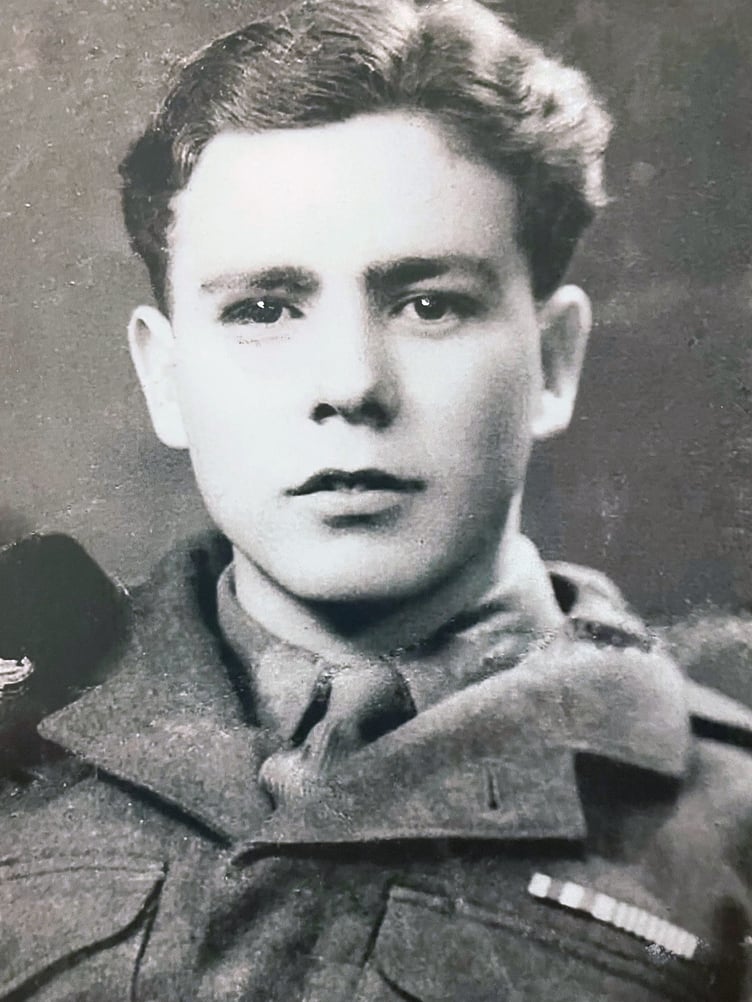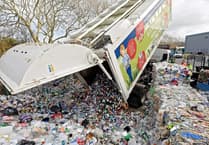Eric Quirk is a well-established personality in Castletown and has been living in the southern town for close to 60 years.
Born in 1932 in Douglas, Eric led a simple life in his first 18 years however, that changed when he was called up for his national service in 1952.
Eric has recently received the ‘Ambassador for Peace’ medal, which is awarded by the defence attaché for the embassy of South Korea in London.
The 90-year-old sat down with me to tell me his story and reflect on his national service in Korea.
He said: ‘We went to a place in Wales for selection, and then we went to Rhyl for eight weeks training on wireless signalling in those days, luckily enough they’d just done away with Morse, thank god.’
Eric was posted to the Second Royal Horse Artillery Regiment in Hildesheim, just outside of Hanover in Germany for nine more training weeks.
Eric was greeted with kindness by the German people despite the Second World War ending less than a decade before his national service started.
He said: ‘It was a lovely little town. We weren’t allowed out in our civvies [civilian clothes], but the German people were very friendly.
‘It’s like every war, isn’t it? Only certain people start it and continue it as we see today, the general public don’t want war.’
It was after this spell in post-war Germany that Eric was sent to Korea to serve in the Korean War, on a carrier called the HM Troopship Empire Orwell.
He said: ‘It took six weeks and one day to get there, we were calling in at all ports such as Columbo, Singapore, Hong Kong and then we finally got to Busan.’
When he arrived in Busan, in what is now known as South Korea, he recalls what he experienced when he first stepped on the ground.
He said: ‘Every soldier or servicemen that has gone into Busan harbour has said the same thing, it was unbelievable, it stank. We don’t know what it was but we were glad to get on a train and get out of there.’
‘Luckily we served with what was called the pastry cook, we only knew him as Mac, he was a little Scottish bloke.
‘We had to work all night and then we went out on parade the next morning so we didn’t do too bad because he looked after the officers he knew.’
It took the train 35 hours to get from Busan to Seoul and a further two hours to get from Seoul to the frontline.
This was because during the war, the train tracks had been torn up so the train wasn’t able to go it’s usual speed due to the lack of track.
When Eric finally arrived at the frontline, the scene was unlike anything he had seen before.
He said: ‘When we got there I was posted into a gun pit, and honest to god, it was the shock of your life.
‘A scouse lad said to me, “Cuppa tea la’?”, and the next thing I got a big army mug of strong tea and “conny onny”[condensed milk].
‘Once, I heard a shout: “Mike Target, Mike Target, Mike Target!” Which meant a full regiment, that means 35 25-pounder guns firing on a single target.
‘I heard all of the batteries signally and then there was just silence, I was starting to go back to sleep and I heard “FIRE! FIRE! FIRE!”
‘The next day we were taking over this command post and were put in charge of the observation post signallers and that was it for a while.’
The company Eric was serving with was supporting the First Battalion of the Norfolk Regiment, and there were ‘lots of skirmishes and a few losses in that time’.
He said: ‘The next regiment we supported was the Black Watch, we supported them in the Second Battle of the Hook.’
The Second Battle of the Hook was the second attempt by the Chinese People’s Volunteer Army (PVA) forces to push United Nations (UN) forced from a crescent-shaped ridge called ‘The Hook’, which was a strategic advantage going forward.
Eric added: ‘We then went on to support the First Battalion of the King’s Liverpool Regiment I think, and I met a Manxman there.
‘I met quite a lot of Manx People in Korea, at the Second Battle of Hook, there was a guy called Cottier from Ramsey, he was wounded in action.’
In the Third Battle of the Hook, Eric remembers another Manxman, by the name of Garrett, who also received his medal of service from the Korean embassy.
Eric also mentioned a Manxman form Douglas by the name of Crow, who served with the Glorious Glosters, and another man from Douglas by the name of Dessie Fox who was taken as a Prisoner of War.
After his two years of supporting the UN forces in Korea in the fight against the communists, he was ordered to Hong Kong where he would spend the rest of his service.
In 1953, whilst Eric was in Hong Kong, King George VI died and the young princess Elizabeth was crowned queen.
He remembers the forces procession for the new monarch.
He said: ‘Every regiment in Hong Kong paraded at the airport with all the guns and everything.
‘Because we were singers we walked behind the guns, and we had bayonets fixed which was an honour for troops.’
Eric remembers that Queen Elizabeth became the patron of the Korean Veterans Association.
He said: ‘The British government didn’t want to give a medal for the Korean War, they tried to say it was a police action, because Clement Atlee, Prime Minister at the time, had a spat with Syngman Rhee, the leader of the Republic of Korea at the time.
‘King George VI then argued that it was a war because during those three years there were four Victoria Crosses awarded and they were only awarded in wartime.’
Eric was on his way home after that, he said: ‘We came back home on the boat called the Empress of Bermuda.
‘There were no duties to do, no guards or anything so we basically got a cruise coming back.
‘We were out on deck sunbathing and going out on shore anytime without getting any duties, I thought that was a good payback, we did our duties.’
Eric has not returned to Korea since leaving in 1953.
He said: ‘I wish sometimes I did go but sometimes I say, “No I don’t want to go back to that place.”
‘The Korean government said that the weather they experienced during the war was the worst in over 100 years, it was getting down to below 40.’
On return to the Isle of Man, Eric then worked as a lettering apprentice for a bus company where he wrote the adverts for the sides of buses.
After that he went into the film industry working on such films as Waking Ned, which was filmed in Cregneash.
Eric is hoping to connect with other servicemen in the island and hopefully other Korean War veterans, for further information, please email [email protected]



.jpeg?width=209&height=140&crop=209:145,smart&quality=75)

Comments
This article has no comments yet. Be the first to leave a comment.